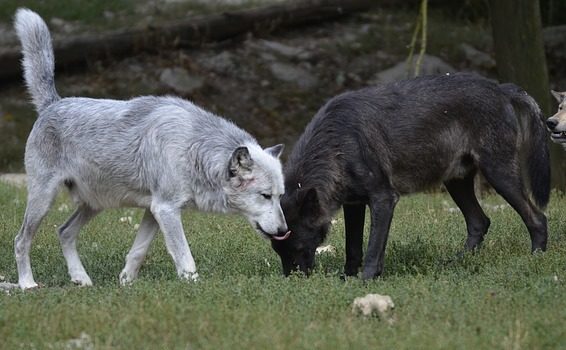Two Wolves
An old Cherokee is teaching his grandson about life:
“A fight is going on inside me,” he said to the boy.
“It is a terrible fight and it is between two wolves. One is evil—he is anger, envy, sorrow, regret, greed, arrogance, self-pity, guilt, resentment, inferiority, lies, false pride, superiority, and ego.”
He continued, “The other is good—he is joy, peace, love, hope, serenity, humility, kindness, benevolence, empathy, generosity, truth, compassion, and faith. The same fight is going on inside you—and inside every other person too.”
The grandson thought about it for a minute and then asked his grandfather: “Which wolf will win?”
The old Cherokee simply replied, “The one you feed.”
According to bloggers Pavor Nocturnus and Apihtawikosisan: This story seems to have begun in 1978 when an early form of it was written by the Evangelical Christian Minister Billy Graham in his book, “The Holy Spirit: Activating God’s Power in Your Life.”
“AN ESKIMO FISHERMAN came to town every Saturday afternoon. He always brought his two dogs with him. One was white and the other was black. He had taught them to fight on command. Every Saturday afternoon in the town square the people would gather and these two dogs would fight and the fisherman would take bets. On one Saturday the black dog would win; another Saturday, the white dog would win – but the fisherman always won! His friends began to ask him how he did it. He said, “I starve one and feed the other. The one I feed always wins because he is stronger.”
The story is apparently neither Inuit (Eskimo), nor is it Cherokee. Several online sources, including Wikipedia references, show that the story has a Christian origin with Christian teachings.
Someone recently read me this alternate ending. (Send me a message if you find a source so I can put it here.) It is still not a true Cherokee story, but just a made-up “story” created for its message. Here the message shifts to a theme of balance and integration of emotions as neither good nor bad.
Which ending is better? You decide.
Alternate Ending
The old Cherokee simply replied, “If you feed them right, they both win,” and the story goes on:
“You see, if I only choose to feed the white wolf, the black one will be hiding around every corner waiting for me to become distracted or weak and jump to get the attention he craves. He will always be angry and will always fight the white wolf. But if I acknowledge him, he is happy and the white wolf is happy and we all win. For the black wolf has many qualities—tenacity, courage, fearlessness, strong-willed and great strategic thinking—that I have need of at times. These are the very things the white wolf lacks. But the white wolf has compassion, caring, strength and the ability to recognize what is in the best interest of all.
“You see, son, the white wolf needs the black wolf at his side. To feed only one would starve the other and they will become uncontrollable. To feed and care for both means they will serve you well and do nothing that is not a part of something greater, something good, and something of life. Feed them both and there will be no more internal struggle for your attention. And when there is no battle inside, you can listen to the voices of deeper knowing that will guide you in choosing what is right in every circumstance. Peace, my son, is the Cherokee mission in life. A man or a woman who has peace inside has everything. A man or a woman who is pulled apart by the war inside him or her has nothing.
“How do you choose to interact with the opposing forces within you will determine your life. Starve one or the other or guide them both.”


